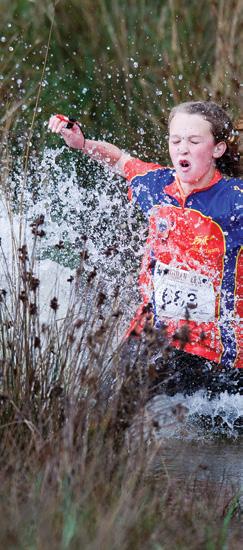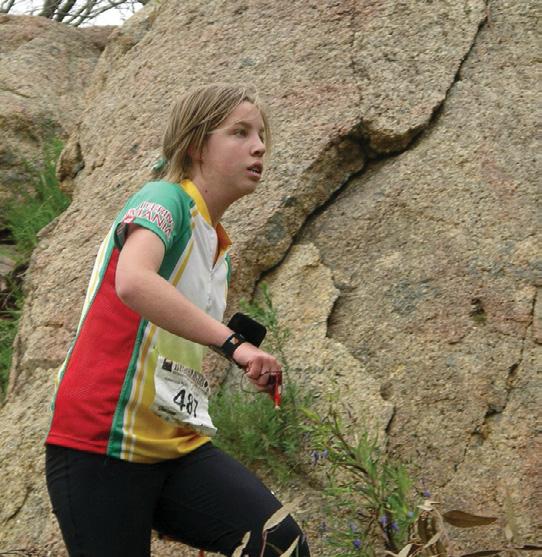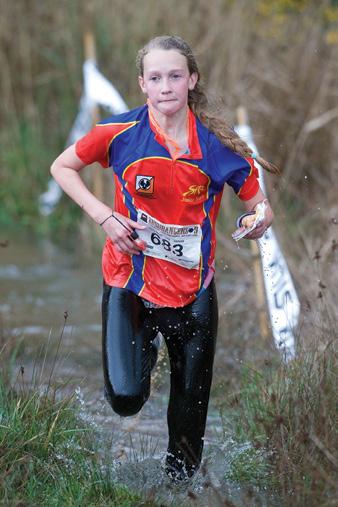
23 minute read
AUSTRALIAN ORIENTEERING CHAMPS
The Trewin Report
Blair Trewin
In 2009 the Australian Championships week came to Victoria. For many of the older generation (including a sizeable overseas contingent), it was the first stage in three weeks of orienteering culminating in the World Masters Championships (or the second stage in four weeks for those who had been to Queensland too). For many others, including some of the largest elite fields seen in many years, it was the culmination of the season.
Australian Middle Distance Championships, Chewton, VIC - 26 Sept.


The week started with the Australian Middle Distance Championships in the gold-mining terrain of Chewton, accompanied by the cold, damp conditions that were to be a regular feature of the week (there was even a flooded creek to negotiate before the last control). The detailed terrain was ideal for Middle Distance orienteering and led to some fine racing. Two clean sweeps of individual elite championships got under way at Chewton. Kathryn Ewels, coming off her fifth place in the World Championships Sprint, would have been considered a serious contender even in a full-strength field, and in the absence of Hanny Allston (just started a new job in Tasmania) she was a very warm favourite. She took a while to emerge from the pack but by the long legs at #7 and #8 she had broken clear, and went on to win with more than a minute in hand. Behind her there were two career-best results at this level in the minor placings. Susanne Casanova finished very well to claim 2nd, in conditions as unlike her now-hometown Darwin as it is possible to get without leaving the country or going to the mountains, while Mace Neve’s consistent run was just enough to hold a fastfinishing Vanessa Round off for third. Mace’s brother, Max, got an outstanding week under way in M20. Going into the week he would have been considered third favourite at best, but he led almost all the way and ended up a minute clear. Behind him there was a tight battle for second, in which Oscar Phillips led for much of the way before Josh Blatchford got the best of the final technical section.
Eleanor Ross, NSW Photo: Ian Dalton
After a week of rain before the Australian Middle Distance Champs at Chewton, a small watercourse feature had turned into a very full creek which all competitors had to cross to get to the finish. The Photoworx website www.photoworx.com.au/ shows how everyone got through the creek. Some, such as W14 Olivia Sprod from South Australia, made a bigger splash than others. Photo sequence: Michael Brown / Photoworx



Rebecca Phillips, Tas Photo: Ken Dowling Josh Blatchford, NSW Photo: Ken Dowling



It seemed like situation normal in M21, with the race fought out between Simon Uppill – the most likely of the local contenders, with the injured Julian Dent missing – and visiting Dane Rune Olsen, a face not unfamiliar to Australian orienteers. After the early skirmishes Uppill was in the lead by #6 and looked to be building a comfortable position, as Olsen recovered from a minute lost at the first control. Uppill then lost a minute at #24 to go within an ace of losing, but had just enough in hand to hold on by eleven seconds. Behind them, Bruce Arthur had his best championship result for several years to take third with a very consistent run. W20 was another close race, and only nineteen seconds separated the four leading contenders – Belinda Lawford, Aislinn Prendergast, Bridget Anderson and Angela Simpson – at halfway. Simpson emerged in the final quarter to put New Zealand on the board, 39 seconds ahead of Lawford. There was a significant overseas presence in many of the veteran classes, nowhere more so than in M60, won by Dave Middleton (NZ), where Paul Hoopmann (3rd) was the only Australian in the top seven. There were three British wins, with Stephen Keyes particularly impressive in dominating a decent M45 field; in M55 it was what was happening behind Eddie Harwood which was especially interesting, with Paul Pacque and Chris Norwood both blowing chances with significant errors and John Wilkinson, more often to be seen in AS, emerging to take the resident championship. It was also a great day for New Zealand. Not for the first time in recent years, their juniors made an immediate impact, with Angela Simpson being joined on the winners’ list by Ben Reynolds (M16) and Selena Metherell (W16), both of whom had comfortable margins. Their veterans also did well; in addition to Middleton’s M60 win, Patricia Aspin was her usual dominant self in finishing five minutes clear of the W60 field, while at the other end of the scale Carey Nazzer did not get the lead in W50 until the last control, squeezing Debbie Davey out by four seconds. It wasn’t a total write-off for the locals. Jenny Bourne was especially impressive in W55, her seven-minute margin a remarkably large one for a Middle Distance race. Geoff Lawford was almost as impressive in winning M50 by four minutes, while in M65 John Brock re-emerged after a long absence from national events to taste immediate success in M65 after a good battle with Darryl Erbacher. Christine Marshall also emerged in W45 after a tight contest with Su Yan Tay, in a class where third


(taken by Sue Hancock over Christine Brown) was decided in the finish chute.
Victorian Long Distance Championships, Choke-Em Gully, VIC - 27 Sept

The Victorian Long Distance Championships offered traditional Long Distance orienteering in the big hills south of Chewton, and provided a mix of the expected and the unexpected. Kathryn Ewels’ second win of the weekend was expected, although the margin was not, and local victories in the junior classes for Aislinn Prendergast and Leon Keely were not a total surprise, but few would have forecast the way M21 would turn out. Dave Shepherd had been largely absent from the scene for the last year after a serious ankle injury, apart from the occasional appearance in a Sprint or Middle Distance, and his result the previous day, fourth, had been respectable without being spectacular. This was his first Long Distance race for more than a year. He started well and held a narrow lead over Simon Uppill for the first two-thirds, then belied any doubts over his endurance by pulling away over the final third to win by four minutes. (The SA Championships, where Uppill was pushed hard by Blair Trewin over the second half, may have been a more significant indicator than they looked at the time). Ewels completely dominated her class, winning all but three of the splits and finishing with a nine-minute break. Once again Susanne Casanova emerged in the second half as the runner-up, while Shannon Jones had her best result of the week to take third. The open, hilly forest was well-suited to Leon Keely’s running abilities, and he was in front in M20 from the start. Lachlan Dow also had a solid run and James Robertson achieved his best result at this level. In W20 Aislinn Prendergast inherited the lead halfway through after a seven-minute error from early leader Angela Simpson at #6, and was in front of Bridget Anderson for most of the way, although the gap narrowed from 1-2 minutes to 37secs at the end. Oscar McNulty’s two-minute win in M16 was a sign of bigger things to come, as was a comfortable victory for Su Yan Tay in W45. The overseas contingent were not quite as successful as they had been the previous day, but still filled four of the top five places in M60 (Britain’s Peter Gorvett winning this time), and there were repeat victories for Patricia Aspin (W60), Sharon Crawford (W65) and Roger Maher (M70). In a reverse of the previous day, this time Carey Nazzer had a last-gasp loss rather than a last-gasp win, with Anthea Feaver overhauling her at the last control in W50 to win by twelve seconds.

Australian Schools Championships, Browns Reef, VIC - 29-30 Sept
For the second successive year, Queensland held sway in the Australian Schools Championships near Bendigo, while New Zealand won the Southern Cross Junior Challenge. It was a closer contest than last year, but the Queenslanders always looked to have their opponents at arm’s length, eventually finishing four points ahead of the ACT with Tasmania another point in arrears. Both races were held on Browns Reef, one of the fastest areas ever used for a major event in Australia, with the 5 min/km barrier broken on several occasions. It was broken most comprehensively by Max Neve, who ran the 8km Senior Boys course in 37 minutes. No-one else was able to match that pace; Lachlan Dow came closest, but drifted out of it a bit in the second half and finished just under a minute behind. Gene Beveridge was the best of the New Zealanders, finishing 3rd after a consistent run. The Senior Girls was decided by the narrowest possible margin, on a day when the top five finished within two minutes. Belinda Lawford held a narrow lead for much of the course, and it looked
Oscar McNulty (WA) – first West Australian to win an individual Schools title. Photo: Ian Dalton
like Angela Simpson might have lost her chance with a minute lost at #12. She came back strongly and narrowed the lead to a single second by the last control – close enough to be able to reverse that margin in the finish chute. New Zealanders filled the next two places too, through Laura Robertson – always in touch but never quite able to get to the front – and Selena Metherell. The biggest surprise was in the Junior Boys. Defending champion Oliver Poland was a red-hot favourite, particularly after some impressive performances mixing it with the M20s during the season. Oscar McNulty had some credentials of his own in older company, beating Craig Dufty to the WA open men’s Sprint title, and showed at Browns Reef that this was no fluke. He got a 35sec jump on Poland at the first control and matched him almost stride for stride from there; no-one else was within six minutes of them. McNulty was the first Western Australian to win an individual title, and with Bill Mann and Joe Dowson also in the top eight they took their first age-group team title as well. Jacqui Doyle was the first finisher in the Junior Girls. Her time looked to be a decent benchmark and so it proved. The strongest challenge she had to withstand was from Michele Dawson, who had a small lead late in the course but could not quite match the Queenslander over the closing controls and was 12secs short. Lauren Turner was also within 20secs of the lead at the fourthlast, but an error saw her lose 3rd to Rebecca Freese. Schools Relay day always has a certain amount of drama. This year’s dose was in the Senior Boys’ race, which ended up in a three-way sprint finish after Lachlan Dow had made up 6mins on
the last leg. NSW were first across the line – only to find that Josh Blatchford had mispunched, which meant that New Zealand had just edged out the ACT. The Junior Girls also saw a tight contest. Queensland and NSW were close all the way, culminating in a excellent final leg contest between Jacqui Doyle and Nicola Blatchford, easily the two fastest on the day. Doyle just held on to add a Relay title to her individual win the previous day, with New Zealand recovering from a slow first leg to take 3rd. A similar duel in the Senior Girls, featuring New Zealand and the ACT, looked in prospect for the first two legs and Angela Simpson and Belinda Lawford went out together, but this time the New Zealander was too good and finished more than 5mins ahead by the end. After a first leg in which five teams were within 2mins, New Zealand’s Junior Boys pulled clear on the second leg and ended up winning the race easily. There was an excellent contest behind them; four teams were within a minute, and Matthew Hill’s storming final leg brought NSW through from 5th to 2nd. Australian Sprint Championships, Benalla, VIC - 2 Oct Proceedings moved to Benalla for the Australian Sprint Championships, with a mix of parks, showgrounds and river flats. It wasn’t the most technical of Sprint areas, but in Sprint racing even small time losses can be critical (something Mace Neve and Shannon Jones found out, when 10sec losses on a minor route choice at the third-last cost them shots at 3rd place). It was a good spectator area which would have been a better one on a less moist day. Unusually for Australia, tracking in the long grass of the river flats was significant, although it developed so early that only the first few junior starters were disadvantaged (and it can’t have been too much of a disadvantage because one of them won anyway). Most of the leading elite contenders started late, but two who didn’t gave the field something to chase. Nick Barrable (editor of CompassSport), who has run for Britain at World Cup level this year, and Rachel Effeney both finished particularly well and posted excellent times early on. Both were eventually beaten, but only once. In M21 Simon Uppill put up a serious challenge, but in the end it was Dave Shepherd who was able to edge out Barrable’s time. He was 6secs clear at the spectator control and needed nearly all of them, scoring by 2secs. Rune Olsen, with significant Sprint credentials for Denmark, was another excellent chance and led at the spectator control, but lost 25secs on the next to fall out of contention. For someone with Kathryn Ewels’ 2009 international credentials, the field at Benalla was unlikely to pose too many problems. Unless something went wrong the only question was likely to be the margin, and the answer was 46secs. It was more of a surprise that no-one else was able to match Rachel Effeney, leaving the Queenslander with a career-best result in her first senior year. Natasha Key, building for her World Masters campaign, completed the placings. W20 was a race of cliffhangers. Aislinn Prendergast was done no favours by the draw, but third start position was no barrier as she posted a time which withstood numerous serious challenges. Bridget Anderson matched her much of the way but did not quite have the pace at the end, Belinda Lawford recovered from a slow start to edge out Anderson, and Laura Robertson also got into the mix with a good run. Prendergast ended up 8secs ahead of Lawford, with only 1sec further back to Anderson and Robertson. Angela Simpson might have been in the mix too had she not missed a control, and the improving Lauren Gillis took another step forward with a 5th place. Max Neve made the Sprint the second of what was to be three national titles. For most of the course he was closely challenged by Leon Keely, who was only 6secs down at the fourth-last, but he then missed the third-last and had to turn back, falling out of contention. There was a major surprise in the minor placings. Oscar McNulty had already impressed greatly in the Australian Schools, but took a step further when he stormed through to 2nd place in a field where he was giving up to five years away to his opponents. Josh Blatchford was 3rd after a consistent run. The other result lists were a mix of the familiar, the unfamiliar and the international. It was not unexpected to see the likes of Jenny Bourne, Paul Pacque, Anthea Feaver and John Brock at the front. New Zealanders once again took out both M16 and W16 through Tim Robertson and Selena Metherell (although some of the better Australians were otherwise engaged in M/W20), and also went 1-2 in W60 through Patricia Aspin and Kate Fortune, while there were French-led international sweeps in M40 and M60, won by Philippe Page and Etienne Bousser respectively. In its short history the Sprint has provided the opportunity for some names to reach the upper end of fields that they might not normally see. Melbourne Street-O has provided the training for some of those names in the past and this year brought us the likes of Judi Herkes (a convincing winner in W65) and Ian Davies (a close 5th in M50), while Simon Phillips gave us an idea of where Oscar’s speed comes from by coming 2nd in M50 despite losing time at the first control.

The final weekend of the Carnival was on the north end of the Warby Ranges. The map took in the northern half of the 1978 Australian Championships map, but 1978-style rock mapping didn’t provide a lot of scope for using the detail of the northern half and that year’s courses largely stayed on top of the plateau (which explains why no-one got within 1 min/km of David Miller’s 1978 pace). There was extensive rock and often low visibility in regrowth, which proved to be challenging, especially a section at the end of the course that brought more than a few unstuck (sometimes after hearing over the PA that they’d gone through the radio control on a good time). It was a pity that the ranges spent the weekend as a drizzle magnet. And it was unclear whether any overseas visitors were unsettled by the road sign proclaiming the area to be habitat for an endangered snake. Kathryn Ewels was looking for a clean sweep of national titles in 2009. Her start was slow and she was only sixth at #3, some 22mins into the race, but from there she took command and pulled further and further away from most of the field. Vanessa Round was the only one able to go close to matching her, sitting a couple of minutes behind for most of the course after early time losses. It was another 5mins back to the next cluster, from which Anna Sheldon, who has had a consistent 2009 without producing anything spectacular, emerged with an excellent final sector; Tracy Marsh and Mace Neve both lost reasonable chances of 3rd there. Dave Shepherd had established his Long Distance credentials the previous weekend and his speed the previous day. His technical skills had never been in doubt and the terrain of Warby suited him well. He was in front by #6 and held it for the remainder of the race, never really putting a foot wrong. Simon Uppill held his race together well this time, but was never quite able to match it with the leading pace and finished two and a half minutes behind. He ended up in 2nd more comfortably than had seemed likely, after Rune Olsen and Bryan Keely both lost significant time in the final section, although they still finished 3rd and 4th. There were some encouraging results from the younger brigade, with Keely joined in the upper end of the field by Murray Scown (6th) and Evan Barr (8th). The M20 race was effectively all over by #6. Max Neve had caught 4mins on Leon Keely by then and set up his third major win of the week. They were together for most of the remainder
of the course and filled the top two placings, without being unduly troubled by a late wobble. In addition to the national championships, the result also secured the National League individual title for Neve. Lachlan Dow never really looked like winning but overhauled Oscar Phillips to take 3rd. Bridget Anderson’s 2009 international campaign had been affected by illness, preventing her from matching her excellent 2008 results. Once back home she had been consistent without managing to win anything of consequence, but this was the day she broke through for her first national title in W20, being rewarded for being the most consistent performer in a race where consistency was in limited supply. Aislinn Prendergast lost time at the end to turn a narrow margin into a comfortable one, but still held 2nd, which was enough to give her a share of the National League with Belinda Lawford. Lawford finished 4th, behind JWOC representative Sarah Buckerfield, who, in her first appearance after returning home, recovered from an early 5min mistake with the best second half of the race. Elsewhere in the Juniors, there was another win for New Zealand in W16, but this time it went to Jula McMillan rather than Selena Metherell (who was 5th). Rebecca Freese kept her head whilst others were losing theirs to be the leading Australian. Todd Neve had been in the background a bit during the week but rose to the occasion in the more technical terrain of Warby to take the M16 title, while Jack Oakhill continued his emergence in his first national carnival in taking M14, and Anna Dowling had a good win in W14. Some of the dominant figures of earlier in the week, both Australian and overseas, dominated again at Warby. Jenny Bourne had a double-figure margin in W55 and Patricia Aspin almost matched her in W60. A more surprising holder of a similar margin was Bjorn Mella, who took M45 by more than 9mins, with the placegetters – Hamish Goodwin and Mark Nemeth – both suffering major time losses in the first half of the course. Geoff Lawford trailed Eoin Rothery for much of the course in M50 but finished the better over the difficult closing section, John Brock’s successful comeback continued with a 3min win in M65, Paul Pacque had a solid win over Eddie Harwood in M55, and Sharon Crawford recovered from 10mins lost at #3 to emerge 25secs ahead in W65. Maureen Ogilvie also came back from early mistakes to overcome Canada’s Nesta Leduc in W75 – a prelude to further contests in the World Masters – and Hermann Wehner (M85) added another to his long list of national titles. Sue Hancock was 3mins ahead of a decent W45 field, and a great second half saw Anthea Feaver win W50 by a similar margin. Elsewhere overseas visitors were prominent. Etienne Bousser backed up from his Sprint win in M60 to win the Long Distance as well, although there was more of a local presence this time with Derek Morris only 15secs behind. Roger Maher led an overseas clean sweep in M70, once again benefiting from a late mistake from John Robinson, and Konrad Wildi took out an M40 race where Paul Liggins (2nd) was the only local in the top six.

Australian Relays, Warby North, VIC - 4 Oct
The week finished with the Australian Relays. Although all the National League team titles were settled, there was still a lot of intrinsic interest in the elite classes, as well as a three-way battle for 2nd in the Senior Men’s League between the Southern Arrows, Canberra Cockatoos and Victorian Nuggets. The veteran fields were also deeper than usual, with a number of international teams adding to the depth. The open women’s Relay saw fluctuating fortunes and three teams within a minute. Tracy Marsh put the NSW Stingers into a good position on the first leg, and Felicity Brown built on that with perhaps her best run at this level, only 38secs off the fastest leg. That put Briohny Davey, who had missed the previous day with an ongoing leg injury, out in front on the last leg, and although she fought valiantly she was unable to hold on. Natasha Key was close enough to be able to put the Victorian Nuggets in front by the spectator control, where they stayed. Anna Sheldon, not for the first time, ran a great final Relay leg to almost get the Queensland Cyclones up, but had to settle for 2nd with the Stingers 3rd. More may be heard of the Cyclones in the Senior division in the coming years, because their Junior women’s depth is formidable. It came through in a W20 Relay which was close with the ACT for one leg, but a no-contest after that, with Bridget Anderson repeating her form of the previous day. New Zealand were never in the race but did manage to get 3rd thanks to Angela Simpson running the day’s fastest time. Another race which was less of a contest than it promised to be was M21, at least at the front. The Cockatoos got a lead on the first leg through Grant Bluett, and were never headed after that as Rob Walter, and then Dave Shepherd, stretched the lead to 5mins. It was close behind that for two legs in a battle which featured the Arrows, the Stingers and two Victorian teams, but the Arrows always looked to have the advantage with Simon Uppill on the third leg, and so it proved, with the Stingers 3rd. Not for the first time, the second Victorian team beat the first team home. The Cockatoos also took out M20 after coming from a long way back. Oliver Poland’s second leg was critical in putting them back in the race, making up 8mins and taking them from 8th to 2nd, but the Nuggets would still have been favoured when Lachlan Dow went out 2mins behind Max Neve. Neve, after an almost flawless week, lost time at #3 to drop behind Dow, and the Canberran was able to hold that lead to the end. The other classes turned on some memorable races, with major reshuffling on the last leg in M65, W55 and M16. W55 was especially memorable, as Barbara Tassell started in 6th place, 13mins down, but came through the field and passed Liz Bourne on the way into the last control to give Tasmania a great win over Queensland. New Zealand were only just behind in 3rd, after Royce Mills almost, but not quite, recovered from losing 12mins on #5 when well ahead. Nine teams finished within 9mins of the lead. In M16 the ultimate winner also came from 6th after two legs, but the margins involved were rather smaller – only 59secs separated the top six at that stage. Oscar McNulty (WA) and Marc Gluskie (Tasmania) emerged from the pack, and it was McNulty who prevailed by a single second in a sprint finish; New Zealand dropped from 2nd to 8th. In M65 the ACT led by 6mins after two legs but could not hold on, with Victoria, set up by Tim Dent’s first leg, winning by 12secs over a British team, while a four-way battle for 4th saw NSW, SA and two Victorian teams finish within 18secs. The other classes were more routine, although neither M55 nor W16 were settled until the final stages; Paul Pacque edged clear of Stephen Flick to give Tasmania M55 by 1min25secs, while New Zealand gradually pulled away from a spirited Queensland W16 team to win by 3mins. In W45, having three good runners – Christine Brown, Sue Hancock and Christine Marshall – was the difference for Tasmania. The ACT had two of the three fastest legs through Liz Abbott and Jenny Bourne, but 6mins was too big a gap for Bourne to make up on the last leg.










